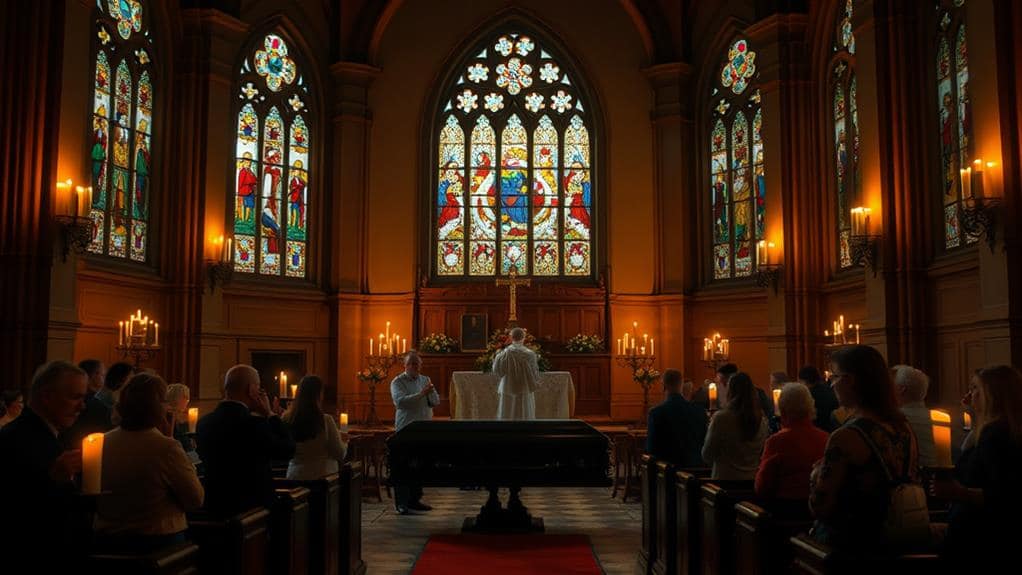Why do unbelievers remain spiritually blind? It's like trying to find your glasses when they're on your head!
The mystery of spiritual blindness involves a complex interplay of divine sovereignty and human free will. Scripture shows us that God actively blinds the eyes of unbelievers, as highlighted in Isaiah 6:10, where He says, "Make the heart of this people dull, and their ears heavy, and blind their eyes."
At the same time, Satan also has a hand in obscuring divine truth through deception. Yet, human choice plays a crucial role in the acceptance or rejection of faith.
By diving into the dynamics of divine sovereignty, human free will, and the devil's influence, we can begin to unravel the mystery of why some remain blind to the truth—it might just be more profound than we think!
Key Takeaways
- Spiritual blindness results from a combination of God's sovereignty and human rejection of faith, rather than just a lack of spiritual knowledge.
- God is actively involved in hardening the hearts of some individuals, exemplified in the biblical narrative of Pharaoh's spiritual blindness.
- Human free will plays a critical role in spiritual blindness, with individuals accountable for accepting or rejecting divine revelation.
- Satan deliberately obscures spiritual truth through deception, fueling unbelief and enhancing spiritual blindness among unbelievers.
- Spiritual insight and faith are divine gifts; their absence is often connected to God's sovereignty in veiling the eyes of unbelievers.
Spiritual Blindness and Divine Intent
One of the most profound mysteries in the domain of spiritual inquiry is the concept of spiritual blindness, where individuals remain impervious to God's message despite being presented with it.
We find ourselves questioning why God would permit such blindness, and what divine purpose it serves. In exploring this phenomenon, we recognize that spiritual blindness isn't merely a lack of faith understanding, but a fundamental barrier to conversion.
The Bible illustrates this concept in the narrative of Pharaoh, where God hardened his heart, raising questions about the interplay between divine sovereignty and human free will.
As we investigate this mystery, we're compelled to examine the scriptural foundations and the role of divine intent in spiritual blindness, seeking to illuminate the complexities of God's veiling.
Theology of Divine Sovereignty
As we seek to understand the intricacies of spiritual blindness, the relationship between divine sovereignty and human free will emerges as a central theme.
We recognize that divine purpose and predestined fate may intersect with human choices, creating a complex web of spiritual insight and faith barriers. We grapple with the concept of God's will and its impact on human understanding, acknowledging that Reformed Theology emphasizes God's sovereign will in spiritual blindness.
However, we also consider the interplay between free will and divine guidance, which presents a theological paradox. As we explore the theology of divine sovereignty, we endeavor to reconcile the coexistence of divine intention and human choice, acknowledging that human choices exist within a framework of divine orchestration.
Scriptural Foundations of Blindness
Examining the scriptural foundations of blindness, we find a complex fabric of divine intervention, human choice, and demonic influence.
We see in Matthew 13:15 and John 12:40 that God's intervention can close hearts and ears, while Isaiah 6:10 highlights spiritual blindness as a divine action.
Exodus 4:21 illustrates God's intervention in Pharaoh's heart, raising questions about free will and predestination.
Through these verses, we recognize that spiritual perception is a critical factor in biblical interpretation.
We must consider the interplay between divine guidance and human choice when interpreting scripture.
By analyzing these scriptural foundations, we gain insight into the mysterious nature of spiritual blindness and the role of divine sovereignty in shaping human understanding.
Our biblical interpretation is informed by the complex relationship between God's will and human spiritual perception.
The Devil's Role in Blindness
Satan, described in Scripture as the father of lies, wields significant influence in spiritual blindness, blinding unbelievers to the truth of the gospel.
We recognize that the devil's role in blindness involves a deliberate attempt to obscure divine truth, employing demonic deception to lead individuals away from salvation.
In 2 Corinthians 4:4, we see that Satan is identified as the one who blinds the minds of unbelievers, preventing them from perceiving the light of the gospel.
As we engage in spiritual warfare, we must acknowledge the devil's cunning strategies to foster doubt and confusion.
Ongoing Theological Debates
Some of the most enduring and complex theological debates surrounding spiritual blindness stem from differing perspectives on the interplay between divine sovereignty and human free will.
We find ourselves grappling with the relationship between God's initiative and human response. The Reformed tradition emphasizes God's sovereign will in spiritual blindness, while others advocate for human responsibility in faith matters.
As we navigate these debates, we must consider the unbelief consequences and judgment implications of each perspective. Does spiritual blindness result from divine action or personal consequence?
How does God's sovereignty intersect with human free will? We're forced to examine the tension between these two concepts, and the implications for our understanding of God's nature and humanity's plight.
Scripture provides guidance, but the paradox remains a subject of ongoing theological inquiry.
Human Choice and Free Will
The concept of human choice and free will is a crucial aspect of the spiritual blindness debate, as it raises questions about the extent to which individuals can choose to accept or reject God's message.
We recognize that human responsibility plays a significant role in this discussion. Scripture emphasizes the importance of individual choice, with consequences resulting from either accepting or rejecting God's message.
For instance, in Matthew 13:15, Jesus notes that the hearts and ears of some individuals are closed, implying a level of personal responsibility.
We must consider how our choices reflect our willingness to accept or reject God's message, acknowledging that these decisions have eternal consequences.
Ultimately, our choices demonstrate our exercise of free will, influencing our spiritual trajectory.
Unraveling the Mystery of Blindness
As we explore unraveling the mystery of blindness, we're faced with a profound question: what drives God's decision to veil the eyes of unbelievers, preventing them from grasping His message?
Through scriptural analysis, we recognize that spiritual insight is a divine gift, and its absence can be a result of God's sovereign will. In Isaiah 6:10, we see God commissioning Isaiah to "make the heart of this people dull, and their ears heavy, and blind their eyes." This verse illustrates God's active role in spiritual blindness.
We must reconcile this with the concept of free will, acknowledging that divine revelation is necessary for true understanding. By examining these dynamics, we gain a deeper understanding of the complex interplay between God's sovereignty and human choice, leading us closer to unraveling the mystery of blindness.
Frequently Asked Questions
Can Spiritual Blindness Be Overcome Through Personal Faith and Prayer?
We analyze the question: can spiritual blindness be overcome through personal faith and prayer? Through faith enhancement and prayer efficacy, we find scriptural evidence suggesting that intentional devotion can indeed counter spiritual blindness, promoting enlightenment.
Does God's Veiling of Unbelievers Contradict His Desire for Universal Salvation?
We're analyzing whether God's veiling of unbelievers contradicts His desire for universal salvation, finding that it presents a faith challenge, testing our understanding of divine will and universal grace, amidst the salvation mystery and spiritual awakening.
How Does One Distinguish Between Divine Hardening and Personal Rebellion?
We tackle the challenge of distinguishing between divine hardening and personal rebellion, balancing divine sovereignty with human responsibility, requiring spiritual discernment to understand individual roles within the complex dynamics of one's faith journey.
Can the Spiritually Blind Still Experience God's Love and Mercy?
We observe that the spiritually blind can still experience God's unconditional love and divine mercy, as Scripture suggests God's nature is love (1 John 4:8), and His mercy is boundless, extending to all people (Romans 11:32).
Is Spiritual Blindness a Permanent Condition or Can It Be Reversed?
We're investigating if spiritual blindness is permanent or reversible, and our analysis suggests that through divine intervention, heart transformation can occur, initiating a faith journey and potentially leading to a profound spiritual awakening.
Conclusion
We've investigated the enigmatic domain of spiritual blindness, grappling with the paradox of divine sovereignty and human choice. Through scriptural analysis and theological debate, we've explored the complex dynamics of God's intent and the devil's role in fostering blindness. Our examination of Reformed Theology and Calvinistic frameworks has shed light on the mysterious interplay between free will and predestination. Ultimately, the profound nature of God's mystery remains, leaving us with a deeper understanding of the unknown.






